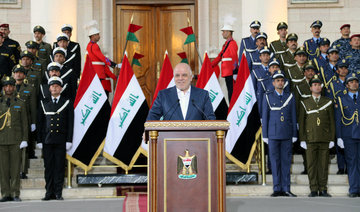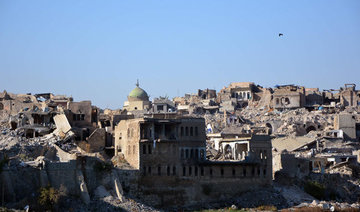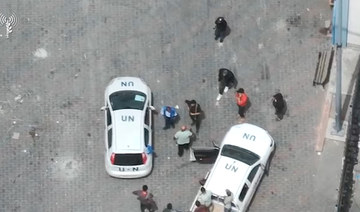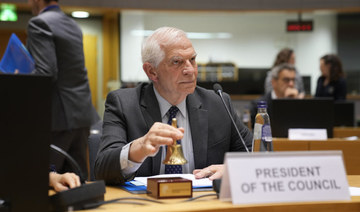This year was a much better one for Iraqis, who have suffered severe security, economic and political conditions during the past three years after Daesh militants overran the northern and western parts of the country and seized almost a third of its territories, killing tens of thousands of people and displacing millions.
All this was accompanied by a quasi-bankrupt treasury and a drain on the country’s financial and human resources because of the war on the militants, but the situation is much improved and Iraq has finally come out of the “neck of the bottle,” according to analysts.
“It is certainly a year of achievements and an end to most of the crises that have strangled Iraq over the past years,” Abdulwahid Tuama, a political analyst told Arab News.
“Liberating the Iraqi territories, ending the war against Daesh, lifting the long-term economic sanctions imposed on Iraq, the rise in oil prices and the significant improvement of the Iraqi-regional relationship are all major breakthroughs achieved in 2017,” Tuama said.
Iraqi Prime Minister Haider Abadi on Dec. 9 declared the end of the three-year-long war against Daesh and the liberation of the Iraqi territories. A day earlier, the UN Security Council unanimously voted on Iraq’s exit from Chapter VII and ended 26 years of economic sanctions imposed on the country since Iraq invaded Kuwait in 1991.
The battle to liberate Mosul, the largest populated Iraqi city-seized by Daesh, was the fiercest, the biggest and the longest in the campaign waged by Iraqi forces and its backers against the radical organization.
More than 100 000 Iraqi troops, backed by US-led military coalition air forces and the Shiite-dominated Popular Mobilization troops, fought for almost nine months to regain control of the city, which included the most important and largest strongholds of the militants, the headquarters of control and command and the biggest weapons depots of the organization in Iraq.
By the end of the battle on Feb. 19, more than 25,000 militants had been killed, military officers said.
“The battle to retake Mosul is the most important one, because it broke the backbone of the organization and completely paralyzed it (Daesh) and ended its military capacity,” Retired Gen. Emad Allow, a EU adviser on terrorism, told Arab News.
“This battle also witnessed a significant development in the combat skills of the Iraqi security forces, as the fighting was fierce and house-to-house because of the nature of the city,” Allow said.
Baghdad has been immersed in its war against terrorism in recent years. This has encouraged the regional government of the Kurdish region, semi-autonomous since the 1970s, to extend its control over the disputed areas which lie outside the 2003-constitutionally approved part of the region.
The northern oil hub city of Kirkuk and its lucrative oil fields are at the core of the disputed areas between Baghdad and Kurdistan since 2003. The Kurdistan regional government held a controversial referendum on independence in late September.
“Holding the referendum (on independence) was like an earthquake that hit the political process in Iraq. It was no less a force in its impact than the (2014) fall of the three provinces into the hands of Daesh,” political analyst Joma’ah Al-A’atoani told Arab News.
“Actually it (the referendum) was even more dangerous because, under the umbrella of national slogans calling for freedom of self-determination, Iraq almost entered a dark corner and it paved the way to cut off a large area of its territory,” A’atoani said.
Baghdad has responded by launching a huge military campaign to drive the Kurdish forces out of Kirkuk, its oil fields and most of the disputed areas. It has imposed a series of punitive measures on the region, including the banning of international flights to and from airports and the closing down of border crossings with Turkey and Iran.
“Gaining back control over the disputed areas and oil fields, shutting down the airports and crossing borders in the region is a major achievement and proved that the Iraqi government is capable of confronting anything that threatens the unity of the country and affects its sovereignty,” A’atoani said.
The year was not limited to military and political achievements. The policy of non-interference in the affairs of other countries in the region, which Abadi has adopted since he became prime minister, has also begun to bear fruit.
The Iraqi-regional relationship has significantly improved in 2017. Abadi has made several regional and international rounds during the past two months, culminating in the signing of several economic, security and military agreements with Turkey, France, Iran, Jordan and other countries.
The most important breakthrough for Iraqis was the improvement of relations between Baghdad and Riyadh, which had been fluctuating for the past three decades.
In February this year, Saudi Foreign Minister Adel Al-Jubeir was the first senior Saudi official to visit Baghdad since 2003.
Al-Jubeir’s visit was followed by a visit from Abadi to Saudi Arabia in June and another one in October to end the boycott between the two countries.
The visits opened the door for the countries to exchange visits and sign joint agreements, particularly in the oil, reconstruction, transport and anti-terrorism sectors. Last month, Saudi Arabia appointed Abdul Aziz Al-Shimari as the new ambassador to Iraq.
“Saudi-Iraqi rapprochement will ease the sectarian strife inside Iraq and deprive the Iraqi rival parties of playing the sectarian card,” Abdulwahid Tuama said.
“Also, it (rapprochement) will bring much economic gain to both countries. Iraq is looking to reach the ports of the Red Sea to export its oil, in return it can offer significant investment opportunities for Saudi companies and goods in many areas and sectors,” Tuama said.
Iraq ‘out of neck of the bottle’ by end of 2017: political analysts
Iraq ‘out of neck of the bottle’ by end of 2017: political analysts

Egypt warns against consequences of Israeli escalation in Gaza

- During talks with his Jordanian and Iraqi counterparts, Ayman Al-Safadi and Fuad Hussein, FM Sameh Shoukry said that there would be negative repercussions for the security and stability of the whole region if Israel escalated its activities in Gaza
- Discussion in Manama took place on the sidelines of an Arabian foreign ministers’ meeting being held in preparation for the Arab Summit
CAIRO: Egypt’s Foreign Minister Sameh Shoukry has warned of dire consequences as a result of Israel escalating its activities in the Gaza Strip.
During talks with his Jordanian and Iraqi counterparts, Ayman Al-Safadi and Fuad Hussein, he also said there would be negative repercussions for the security and stability of the whole region.
The discussion in Manama on Wednesday took place on the sidelines of an Arabian foreign ministers’ meeting being held in preparation for the Arab Summit.
Shoukry talked about Egypt’s efforts to reach an immediate, comprehensive and lasting ceasefire in Gaza and its call for allowing immediate delivery of humanitarian aid.
He also stressed his country’s categorical rejection of any attempts to displace Gazans or kill the Palestinian cause.
He underlined the need to stop targeting civilians, halt Israeli settler violence, and allow aid access in adequate quantities “that meet the needs of our Palestinian brothers.”
During the meeting, Shoukry also reaffirmed Cairo’s support for the stability of Iraq and Jordan and emphasized the importance of implementing directives from the three countries’ leaders to boost cooperation within the framework of the tripartite mechanism.
He said Egypt viewed tripartite cooperation as a way to link the interests of the three countries and maximize common benefits. The discussion also underlined the importance of putting into effect agreed joint projects as soon as possible.
During a separate meeting with Iraqi minister Hussein, Shoukry reiterated the directives of President Abdel Fattah El-Sisi to develop relations between the two countries in various fields.
The Iraqi minister highlighted close historical ties with Egypt that required continued coordination on the various challenges plaguing the region. Hussein also hailed the key role played by Egypt to bring about an end to the crisis in Gaza.
Netanyahu says he hopes Israel can get aid, overcome US disagreements

- Sources said the US State Department moved a $1 billion weapons aid package for Israel into the congressional review process
WASHINGTON: Israel Prime Minister Benjamin Netanyahu said he hoped to receive US military aid and to overcome US President Joe Biden’s pause on certain weapons, vowing to fight Hamas without American support amid what he called a disagreement with Washington.
On Tuesday, sources said the US State Department moved a $1 billion weapons aid package for Israel into the congressional review process. Asked in a CNBC interview that aired on Wednesday if he could confirm the $1 billion package movement, Netanyahu declined to say but added that he appreciates US assistance.
Blinken says Israel needs a clear and concrete plan for Gaza’s future

- “We do not support and will not support an Israeli occupation. We also of course, do not support Hamas governance in Gaza...” Blinken said
- Israel says it intends to keep overall security control and has baulked at proposals for the Palestinian Authority to take charge
KYIV: Israel needs a clear and concrete plan for the future of Gaza where it faces the potential for a power vacuum that could become filled by chaos, US Secretary of State Antony Blinken said on Wednesday.
Washington and its ally Israel say Hamas cannot continue to run Gaza after militants from the group ignited the conflict with attacks on southern Israel that killed 1,200 people on Oct. 7.
“We do not support and will not support an Israeli occupation. We also of course, do not support Hamas governance in Gaza... We’ve seen where that’s led all too many times for the people of Gaza and for Israel. And we also can’t have anarchy and a vacuum that’s likely to be filled by chaos,” Blinken said during a press conference in Kyiv.
The US top diplomat has held numerous talks with Israel’s Arab neighbors on a post-conflict plan for Gaza since Israel vowed to root out Hamas from the Palestinian enclave more than seven months ago.
But Israel says it intends to keep overall security control and has baulked at proposals for the Palestinian Authority, which governs with partial authority in the Israeli-occupied West Bank, to take charge.
“It’s imperative that Israel also do this work and focus on what the future can and must be,” Blinken said. “There needs to be a clear and concrete plan, and we look to Israel to come forward with its ideas.”
Turkiye tells US that Israel’s attack on Rafah unacceptable, Turkish source says

- Fidan also told Blinken that it was important to achieve a ceasefire in Gaza as soon as possible
ANKARA: Turkish Foreign Minister Hakan Fidan told his US counterpart Antony Blinken in a call on Wednesday that Israel’s attack on the Gazan city of Rafah is unacceptable, a Turkish diplomatic source said.
Fidan also told Blinken that it was important to achieve a ceasefire in Gaza as soon as possible, while emphasising that obstacles to the access of humanitarian aid into the enclave must be removed, the source said.
Ireland to recognize Palestinian statehood ‘this month’: FM Martin

- FM Micheal Martin: ‘We will be recognizing the state of Palestine before the end of the month’
- Martin: ‘The specific date is still fluid because we’re still in discussions with some countries in respect of a joint recognition of a Palestinian state’
DUBLIN: Ireland is certain to recognize Palestinian statehood by the end of May, the country’s Foreign Minister Micheal Martin said on Wednesday, without specifying a date.
“We will be recognizing the state of Palestine before the end of the month,” Martin, who is also Ireland’s deputy prime minister, told the Newstalk radio station.
In March the leaders of Spain, Ireland, Slovenia and Malta said in a joint statement that they stand ready to recognize Palestinian statehood.
Ireland has long said it has no objection in principle to officially recognizing the Palestinian state if it could help the peace process in the Middle East.
But Israel’s war against Hamas militants in Gaza has given the issue new impetus.
Last week, EU foreign policy chief Josep Borrell said Spain, Ireland and Slovenia planned to symbolically recognize a Palestinian state on May 21, with others potentially following suit.
But Martin on Wednesday shied away from pinpointing a date.
“The specific date is still fluid because we’re still in discussions with some countries in respect of a joint recognition of a Palestinian state,” he said.
“It will become clear in the next few days as to the specific date but it certainly will be before the end of this month.
“I will look forward to consultations today with some foreign ministers in respect of the final specific detail of this.”
Last month during a visit to Dublin by Spanish premier Pedro Sanchez, Irish prime minister Simon Harris said the countries would coordinate the move together.
“When we move forward, we would like to do so with as many others as possible to lend weight to the decision and to send the strongest message,” said Harris.
Harris’s office said Wednesday that he updated King Abdullah II of Jordan by telephone on Ireland’s plan for statehood recognition.
Harris “outlined Ireland and Spain’s ongoing efforts on Palestinian recognition and ongoing discussions with other like-minded countries,” a statement read.
“The King and the Taoiseach (prime minister) agreed that both Ireland and Jordan should stay in touch in the coming days,” it added.
The conflict in Gaza followed Hamas’s unprecedented October 7 attack against Israel, which resulted in the deaths of more than 1,170 people, mostly civilians, according to an AFP tally of official Israeli figures.
Militants also seized about 250 hostages, 128 of whom Israel estimates remain in Gaza, including 36 the military says are dead.
Israel’s retaliatory offensive has killed more than 35,000 people in Gaza, mostly women and children, according to the Hamas-run territory’s health ministry.






















